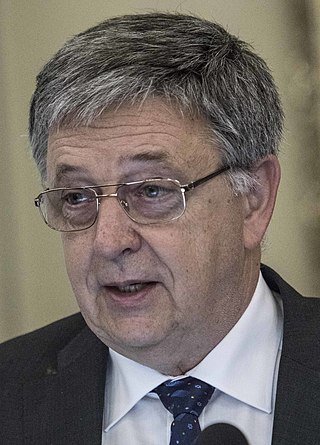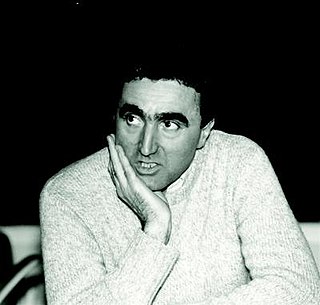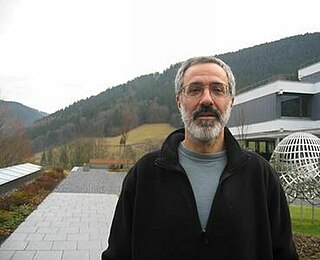
In graph theory, the unproven Erdős–Gyárfás conjecture, made in 1995 by the prolific mathematician Paul Erdős and his collaborator András Gyárfás, states that every graph with minimum degree 3 contains a simple cycle whose length is a power of two. Erdős offered a prize of $100 for proving the conjecture, or $50 for a counterexample; it is one of many conjectures of Erdős.

Krystyna M. Kuperberg is a Polish-American mathematician who currently works as a professor of mathematics at Auburn University, where she was formerly an Alumni Professor of Mathematics.
The Fulkerson Prize for outstanding papers in the area of discrete mathematics is sponsored jointly by the Mathematical Optimization Society (MOS) and the American Mathematical Society (AMS). Up to three awards of $1,500 each are presented at each (triennial) International Symposium of the MOS. Originally, the prizes were paid out of a memorial fund administered by the AMS that was established by friends of the late Delbert Ray Fulkerson to encourage mathematical excellence in the fields of research exemplified by his work. The prizes are now funded by an endowment administered by MPS.
George Neil Robertson is a mathematician working mainly in topological graph theory, currently a distinguished professor emeritus at the Ohio State University.

Paul D. Seymour is a British mathematician known for his work in discrete mathematics, especially graph theory. He was responsible for important progress on regular matroids and totally unimodular matrices, the four colour theorem, linkless embeddings, graph minors and structure, the perfect graph conjecture, the Hadwiger conjecture, claw-free graphs, χ-boundedness, and the Erdős–Hajnal conjecture. Many of his recent papers are available from his website.

László Lovász is a Hungarian mathematician and professor emeritus at Eötvös Loránd University, best known for his work in combinatorics, for which he was awarded the 2021 Abel Prize jointly with Avi Wigderson. He was the president of the International Mathematical Union from 2007 to 2010 and the president of the Hungarian Academy of Sciences from 2014 to 2020.

Ben Joseph Green FRS is a British mathematician, specialising in combinatorics and number theory. He is the Waynflete Professor of Pure Mathematics at the University of Oxford.

Hendrik Willem Lenstra Jr. is a Dutch mathematician.

In mathematical programming and polyhedral combinatorics, the Hirsch conjecture is the statement that the edge-vertex graph of an n-facet polytope in d-dimensional Euclidean space has diameter no more than n − d. That is, any two vertices of the polytope must be connected to each other by a path of length at most n − d. The conjecture was first put forth in a letter by Warren M. Hirsch to George B. Dantzig in 1957 and was motivated by the analysis of the simplex method in linear programming, as the diameter of a polytope provides a lower bound on the number of steps needed by the simplex method. The conjecture is now known to be false in general.

Greg Kuperberg is a Polish-born American mathematician known for his contributions to geometric topology, quantum algebra, and combinatorics. Kuperberg is a professor of mathematics at the University of California, Davis.
Polyhedral combinatorics is a branch of mathematics, within combinatorics and discrete geometry, that studies the problems of counting and describing the faces of convex polyhedra and higher-dimensional convex polytopes.

Gil Kalai is an Israeli mathematician and computer scientist. He is the Henry and Manya Noskwith Professor Emeritus of Mathematics at the Hebrew University of Jerusalem, Israel, Professor of Computer Science at the Interdisciplinary Center, Herzliya, and adjunct Professor of mathematics and of computer science at Yale University, United States.

Maria Chudnovsky is an Israeli-American mathematician working on graph theory and combinatorial optimization. She is a 2012 MacArthur Fellow.

Louis Joseph Billera is a Professor of Mathematics at Cornell University.
Jim Geelen is a professor at the Department of Combinatorics and Optimization in the faculty of mathematics at the University of Waterloo, where he holds the Canada Research Chair in Combinatorial optimization. He is known for his work on Matroid theory and the extension of the Graph Minors Project to representable matroids. In 2003, he won the Fulkerson Prize with his co-authors A. M. H. Gerards, and A. Kapoor for their research on Rota's excluded minors conjecture. In 2006, he won the Coxeter–James Prize presented by the Canadian Mathematical Society.
Robin Thomas was a mathematician working in graph theory at the Georgia Institute of Technology.

Jeffry Ned Kahn is a professor of mathematics at Rutgers University notable for his work in combinatorics.
Balázs Szegedy is a Hungarian mathematician whose research concerns combinatorics and graph theory.

Tamar Debora Ziegler is an Israeli mathematician known for her work in ergodic theory, combinatorics and number theory. She holds the Henry and Manya Noskwith Chair of Mathematics at the Einstein Institute of Mathematics at the Hebrew University.













